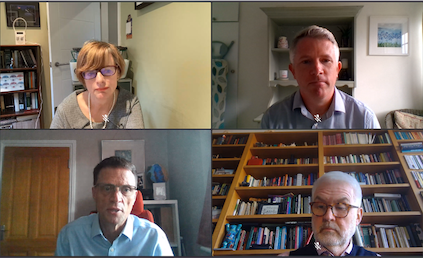Managing change – navigating the complexity to succeed
Summit 2021: On day four, Matthew Taylor, Chris Creegan and Geoff Underwood discuss managing change under pressure, motivating people and how managers can be open, honest and even vulnerable in the face of the crisis.

The launch of MiP’s new guide to managing change could not have come at a better time, said Geoff Underwood, MiP national committee member for the South West, opening the fourth and final webinar of MiP’s online Summit week.
Chairing a wide ranging discussion on managing change, Underwood said there were few NHS managers who have not had to cope with and lead staff through change – and plans to put ICSs on a statutory footing and abolish CCGs mean more is already on the way.
Underwood pointed out that as well as the ICS reforms, managers would have to cope with changes brought by the pandemic – some of which would be embedded while others would not – and many issues outstanding from before the pandemic which still needed to be addressed.
NHS Confederation chief executive Matthew Taylor said that while all parts of the service were under severe pressure – the result of two years of pent-up demand, continuing Covid cases and winter pressures – it would not be “an existential crisis” for the NHS.
Creative communities with a cause
He described bringing about change as feeling like pushing “a heavy awkwardly-shaped object up a steep slope”: it needed a push from behind, someone at the front to see where it was going and someone to control it and keep it on a straight path.
Driving forward change needed “to link in with people’s intrinsic motivations for doing things”, he said. These motivations were generally “because they were told to”, “because of the tribe they were in and the resulting shared values such as professionalism and sense of social responsibility”, and “because they wanted to do them”.
“An organisation is much likely to succeed and change to happen when we articulate and balance those three drivers,” he said, while having the three drivers out of balance could be destabilising. He described organisations that are successful in driving change as “creative communities with a cause.”
Take people with you
Chris Creegan, who wrote MiP’s guide, said it was intended to stimulate conversations among MiP members “There is vast amounts of literature on change in the NHS but this guide is very focused on change management which is a continuous, never-ending process,” he explained. “The idea that we change something and it has a beginning, middle and end and then we move on is quite nonsensical.”
“The key message is about taking people with you in the change process,” he added. “The guide acknowledges that you can’t cherry pick. It’s not something you do from the top down or bottom up, it is something that you do from both ends of the spectrum and in the middle if it is going to be sustainable.”
Underwood asked how managers could approach change with creativity when the NHS was under such severe pressure and they were “under the cosh to deliver”.
Taylor urged managers to be “open and to some extent vulnerable” and to trust colleagues and staff. “It might feel heroic to swallow it all up like Sajid Javid is doing, saying, ‘Crisis, what crisis?”, he said, but this only disempowered staff who felt they were living through a crisis. Some hospitals were now making it clear that they could not do more work, even with the extra money available, Taylor said, adding that he hoped this would prompt new thinking about how the money could be used to greater effect – such as on social care salaries.
“Tell people the truth and look vulnerable without looking as if you can no longer lead,” he advised. “If we can get through the winter, I think the future of the NHS can be positive. The government has given a reasonable revenue and capital settlement….there is scope for progress in many areas,” he added. “Tell staff it can’t go on for ever. You have to give people hope.”
Collaborate and push back
Taylor urged NHS England to give ICSs the space to develop without too much central involvement. “As managers we can find ourselves in a position where we have almost become infantilised – we expect to be told what to do all the time,” he said.
Although there was a slight tendancy to exaggerate the constraints public sector managers were working under, this approach to the ICS reforms needed to be resisted, he added, and the best way to do this was through partnership working with local authorities and the voluntary sector. “Collaboration is going to protect it. If we are a group and we all share the same vision it is easier to push back,” he said.
One of the challenges for NHS managers is bringing together the various groups in the service around a shared purpose to bring about change, Taylor argued. Leaders needed a “sensitivity” to sub-groups within their organisations and to understand their different motivations, such as the value doctors place on their professional status.
Creegan advised managers to ask, “What is the common cause that is going to enable people to work together?” while not being “naïve about the things that may differentiate and divide people. If people can’t find the common cause then you can make the change but it will be artificial and won’t stick“
Related News
-

MiP responds to the abolition of NHS England
Government risk repeating same mistakes as Lansley by abolishing NHS England and cutting more staff from ICBs, says MiP.
-

NHS England and central staff could be cut by 50%, NHSE has announced
Government planned cuts at NHS England go much further than previously announced, with up to 50% of staff at risk.
-

New MiP survey shows growing support for principle of regulating managers, but warns it won’t improve patient safety
MiP’s member survey on regulating NHS managers shows managers are still not convinced regulation will improve patient safety or raise standards, despite growing support for it in principle.